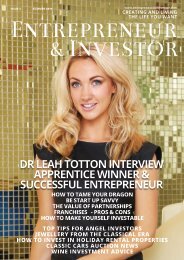START-UP ADVICE
You also want an ePaper? Increase the reach of your titles
YUMPU automatically turns print PDFs into web optimized ePapers that Google loves.
SPEND IT<br />
TRAVEL<br />
CHEF INTERVIEW: MARTIN B<br />
WHATLEY MANOR’S MICHELIN STARR<br />
1. You’ve kept company with some of the most<br />
driven, talented and perfection-demanding chefs<br />
around. How do you cope with the pressure of<br />
working in such environments?<br />
You cope with it because you want to do it. I personally<br />
invest lots of time in training my team and<br />
providing them with a structure that makes the<br />
kitchen run efficiently. This lessens the pressure<br />
directly on me and distributes it evenly throughout<br />
the team. I’m a firm believer that you are only as<br />
good as your team, and the structure we have helps<br />
us to perform well together under pressure.<br />
2. What was the toughest, most challenging time<br />
in your professional career?<br />
I worked for John Burton Race for six years, first at<br />
L’Ortolan and then The Landmark Hotel, Marylebone,<br />
London. I was so pleased when we retained<br />
the Michelin Two Star rating at The Landmark as we<br />
had taken a risk by essentially uprooting a country<br />
house restaurant and moving it to the city. I was<br />
Burton Race’s head chef, so had significant responsibility<br />
in making sure the kitchen ran smoothly and<br />
achieved what was expected. Then one day John<br />
decided he was going to pull the plug on the business<br />
and do his ‘French Leave’. My daughter was<br />
only one day old and I found myself out of a job. But<br />
then Alan Murchison (L’Ortolan), a former colleague<br />
and friend of mine, spotted the Whatley Manor opportunity<br />
and I went for it. It was challenging going<br />
it alone, but luckily for me, 11 years later I’m still<br />
very happy to be at Whatley Manor.<br />
Throughout my career I’ve worked with some incredible<br />
head chefs. Michael Croft gave me the solid<br />
classical training that’s important when you first<br />
start in a kitchen. David Moore and Richard Neat<br />
from Pied à Terre introduced me to the Michelinstar<br />
world, and how mentally and physically tough<br />
you need to be to work in such a kitchen. Clive<br />
Fretwell at Le Manoir aux Quat’ Saisons taught<br />
me how to work in a professional, structured and<br />
disciplined kitchen. Raymond Blanc trained my<br />
palate, teaching me how to maximise flavours from<br />
ingredients. Finally, John Burton Race gave me the<br />
freedom to express food on a plate and the empowerment<br />
to run his kitchen for him.<br />
4. What would you say are your key culinary<br />
influences now?<br />
I’m a seasons man, although autumn is tough because<br />
by and large the game isn’t good enough and<br />
again in February the same happens. I feel you wait<br />
forever for spring to come and the vegetables to be<br />
ready, although I’m not an absolute purist on the<br />
seasonality of the menu as I feel it may get too repetitious.<br />
I try not to get too influenced by trends. A<br />
while ago I ate at Per Se and it was like an epiphany<br />
for me. It showed me what great food should really<br />
be about – keep the ingredients true to themselves,<br />
beautifully done but not too complicated.<br />
3. Who would you say your main mentors have<br />
been, and how have you learnt from them?<br />
116




